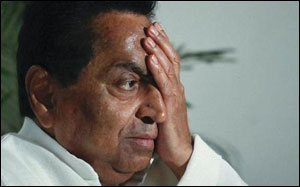In 1976, Kamal Nath, now urban development minister, may have benefited from “a very large” contract awarded under the then West Bengal power minister, A B A Ghani Khan Choudhury, according to a 37-year-old communication between the US Embassy in New Delhi and the US State Department in Washington.
 A series of diplomatic cables, available on WikiLeaks and the United States National Archives, contain mentions of Nath backing Choudhury as a replacement for then West Bengal chief minister Siddhartha Shankar Ray, a position Pranab Mukherjee, now president, too, was said to be eyeing.
A series of diplomatic cables, available on WikiLeaks and the United States National Archives, contain mentions of Nath backing Choudhury as a replacement for then West Bengal chief minister Siddhartha Shankar Ray, a position Pranab Mukherjee, now president, too, was said to be eyeing.
“Nath said that while... Pranab Mukherjee is the one most frequently cited to replace Ray, the job would probably go to GoWB (Government of West Bengal) power minister Barakat Ghani Khan Chowdhury,” reads cable 1976NEWDE17173_b sent on November 26, 1976.
The communication further suggests Nath’s company, which produced electrical cables, had been given a large West Bengal government contract, possibly while Choudhury was in office, and described the company as “probably as profitable an enterprise as one could find in all of India” at that time.
Another cable, sent on September 17, 1976, from the New Delhi Embassy to Washington, mentions, “Nath has sponsored Ghani Khan Chaudhury, GoWB minister for power and irrigation, who is said recently to have awarded a very large contract to Nath’s firm (Nath manufactures power cable), first as replacement for Ray, and when that failed as a member of the proposed oversight committee...”
Attempts to contact Nath were unsuccessful till the time of going to print.
‘Bull in a China shop’
Nath, described variously as “Sanjay’s Gandhi’s eminence grise (an unofficial, but powerful decision maker)” and Gandhi’s “school buddy and chief operator” in West Bengal, who spoke with “brashness, boastfulness and at times naive simplicity”, according to US diplomats who lunched with him in New Delhi on November 25, 1976.
However, he was deemed as useful and suitably disposed towards the American diplomatic corps. “Nath was the first to alert us (early last fall, weeks before the story reached the press even as a rumour) to the impending ouster of P R Das Munshi from the presidency of the Youth Congress,” reads cable 1976NEWDE17173_b, adding that Nath had studied and worked in the US, and goes there frequently.
Nonetheless, the diplomats were sure that Nath wasn’t someone they would “want to be identified with”. The cable from 1976 says, “He is a bull in a China shop, a political novice who if he has his way (and that is just possible) will destroy the delicate equilibrium within the state Congress party.”











